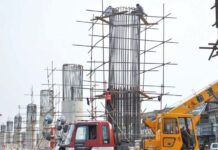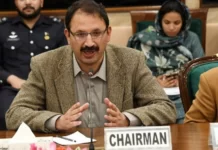Electric vehicles, refilling initiatives, waste management, forest farming, and trucking. These were some of the topics discussed at a roadshow in Pakistan organised by the Climate Finance Accelerator of the UK government last month in February.
The CFA is a technical assistance program spanning four years. The idea behind the initiative was to find solutions to the global climate crisis by providing technical assistance to private and government projects in countries most affected by climate change. The purpose of the Pakistan roadshow was to bring startups and projects that are bringing green initiatives to the table with leading investors and government officials.
The roadshow itself featured a number of climate focused projects. What was more interesting, however, was the roundtable that took place the day after the roadshow. The panel discussion brought government officials, bankers, investors, and companies all to the same table where they discussed the prospective projects. And while things began with simple discussions regarding what each project was, the discussion was pointed at times.
There was a clear divide between the investor and startup end of the table. Investors felt that the projects were unwilling to take on debt and were depending highly on equity. They have a point. Startups at times are hesitant to take on the risk of debt and instead offer equity in exchange. This is risky for financers such as banks however since if the business does not work out they simply lose out on the money they put in. On the other hand, the companies felt that investors and banks were slow in processing new initiatives that they are not familiar with.
So what is the truth? Profit takes you through the pitches at the CFA roundtable to give an insight into up and coming climate startups, and those possibly investing in them.
CFA Pakistan Pitches
The roundtable discussion at the road show was commenced by introductory addresses by the representatives of CFA and DAI, followed by founders, and in some cases representatives, of the projects participating in the event.
The companies participating in the road show spanned over sectors such as, mobility, waste management, logistics and agriculture, proposing climate friendly solutions to concerns relating to their respective industries.
Charge Vehicles
This Lahore-based company is a connected e-mobility company founded in early 2020. In their introductory pitch, the representative of Charge Vehicles admitted to having been actively working for the past year and a half to further develop and build their factory plan, ensuring their product is up to mark.
“It is no secret how expensive solar is and we as early entrants in sustainability projects at this stage, start compromising on the quality of the project or product. We’re not going to get to a 999 point reduction in years to come. So, what we saw as being differentiated in the industry was that everyone was going way too early, way too quickly at the bottom of the lower end from households to appeal to the masses in terms of the product,” they explained.
“That basically meant they were reducing the quality of the product, the quality of the batteries, and the quality of the overall build of the product. But what we essentially wanted to do with our product was to not compromise on quality to make it affordable, given that we understood early adopters of this technology are going to be influencers and people who are looking for a lifestyle change, therefore, having a better price cap to afford these products.”
It took Charge vehicles over a year and a half to build top notch, top quality products based on lithium ion battery packs, equip their factory with the right tools, get EDV registered, and become a world manufacturer licence as well. They also added that the stringent focus on building and developing was to create electric vehicles fit for exporting.
BridgeLinx Technologies
Rubab Zahra Sarfaraz, the data lead at BridgeLinx proceeded with her pitch, elucidating, “BridgeLinx is basically a trade marketplace of Pakistan, which means it’s basically Google for tracking. We connect shippers with commercial trucks.” The startup has been operational for three years.
She highlighted that the Pakistani trade industry has been offline for several years and the sector incurs losses worth $3 billion each year.
“So, BridgeLinx builds technologies and algorithms to moderate the whole cargo load transportation.” She disclosed to the investors and attendees that BridgeLinx had raised $3 million previously and is now looking to close their next financing round of $2 million.
Davaam Life
Co-founder of Davaam Life Omer Ghaznavi shared the story of how their idea for creating a system for waste management to limit landfill and enable a culture of recycling was conceived, “Even though our company Davaam Life was formed two years ago, its origin dates back five years, when we were involved in waste management. My partner and I had created a solution to recycle municipal waste and we were managing around 20 tonnes of municipal waste collected in Karachi.”
He continued, “We managed to recycle 75% of what we were collecting using very low tech, but in doing so we realised that one of the biggest waste streams coming out, which was quite expensive and made us some money in that business, were plastic bottles. Taking into account the costs associated with plastic bottles, along with research into their transportation, production, and disposal methods, we devised a concept aimed at reducing expenses for various everyday FMCG products by minimising or eliminating packaging altogether.” This helped Davaam create a network of refill stations.
Now, the company has over 30 stations in Karachi, with plans to go nationwide over the next four years. To kickstart a refill revolution in Pakistan, Davaam now seeks to raise $1.8 million. Ghaznavi concluded his pitch by sharing that this investment would enable Davaam to provide customers with quality products at a much lower price and provide vendors with lower costs on their end by taking away packaging, warehousing and other associated costs.
Pact Capital
Pact Capital is an afforestation project. Fatima Khushnud, CEO of Pact Capital, said, “There’s no single conversation that happens without the mention of climate and its impact and that’s why our project completely aligns with that. Our project concept is very simple. We have planted trees with the sole purpose of generating carbon credits.”
She shared that Pact has done this across three unique locations in Pakistan, having planted four million trees currently, with a $2.5 million investment already being done over an area of 2000 hectares.
“Our project is generating around 10 credits per hectare and for the 5000 hectares mark, we will be generating 50,000 credits. Currently the market price for these credits is around $6 to $12 which is going to touch approximately $20 by 2030 and then eventually $50 by 2050.”
Pact’s plans for the near future include scaling their footprint up to 5000 hectares and eventually 15,000. The company is now looking for an additional $3 million to scale it up to 5000 hectares further and then another $12 million to continue growing.
Sky Agri
Sky Agri, as described by Mohammed Abbasi, is a company that works to improve food security in Pakistan. “We are formed by a fertiliser company and what we are pitching here is the roadmap to a food security Pakistan. We have our expertise in precision farming. Precisely it is the use of agriculture drones for the monitoring and spraying application in agriculture,” Abbasi explained.
Continuing to pose a question for the table to ponder over: Why agriculture?
After a brief pause, he answered, “I’ll talk first about Pakistan. We don’t represent our project only, but represent the 60% of our population that is engaged with agriculture.” He said that they are suffering every hour because climate change has impacted agriculture by genetics.
Abbasi emphasised on the need to invest in the right technology at the right time, to not only mitigate the impacts of climate change but also to halt the GHG emissions. “It is one sector which contributes around 11% of the global GHG emissions, which is not because of agriculture in itself but the practices that have been adopted,” he highlighted.
He continued to stress how important this transition is for Pakistan, by sharing that Sky Agri is already on ground with the Pioneer 50 UAVs project which serves farmers. In the second phase of the project, the company is looking to scale up. Abbasi insisted, “This scale up will equip us with another 85 drones to reach every farmer in every corner of Pakistan.” This is expected to contribute to not only national food security, but also the productivity and profitability of every household attached to agriculture.
National Foods- Sustain Agro
A household name in Pakistan, National Foods is one of the biggest FMCGs in Pakistan. Syed Maaz, the Deputy Manager Planning at National Foods pitched the FMCG’s project called Sustain Agro.
“More than a year ago, we realised that we were hyper-focused on our imports. Be it tomatoes or other agri crops. We initiated a project where we started localising tomatoes for tomato paste, as we are one of the biggest sellers of ketchup in Pakistan. But very soon we also realised that agri has some inherent issues that cannot be dealt with so easily and this sector unfortunately is dying a very painful death. That’s where we realised that we need to take a leap forward in order to sustain this whole domain of Pakistan and that’s how Sustain Agro came into being.”
Sustain Agro is focused on conversion farming on over 500 acres, with plans to scale it up further. Maaz highlighted that this is still not the solution to most of the problems. “What we are pitching today is a greenhouse solution, which is more technologically advanced compared to whatever has happened in Pakistan yet.”
National Foods pitched a 100x increase in yields on an overall basis. Taking the example of tomatoes, Pakistan produces four tonnes per acre, while Sustain Agro’s greenhouse houses a capacity to touch 200 tonnes per acre. And that’s a very basic sort of greenhouse, according to Maaz.
“If we talk about technology used in the Netherlands, then we can go up to 400 tonnes per acre. So this is how it can completely revolutionise all the sector but while we are localising our own inputs, we are also taking a very ecosystem centric approach and making model farms in Swatman Sehra area, which is utilising a lot less energy and significantly reducing the overall operational cost of the system,” explained Maaz.
National Foods aims to scale up and provide these technologies to numerous farmers, particularly women farmers, giving them the opportunity to sell their produce to National and independently in the market.
The investors and the founders face off
Founders and investors engaged in a productive discussion, both sides presenting not only their vision but also the challenges they encounter, which for founders span over opportunities, policy constraints and awareness, while for investors the standout challenges were risks.
Abbasi, from Sky Agri reminded the panel that throughout history, agriculture has thrived in our region, making it a prime investment area. He elaborated, “When we began our project—providing agricultural drone services for farmers—we immediately thought of the farmers themselves. They’ve witnessed generations of agricultural practices and are central to our market base. Our experience showed that Pakistani farmers, regardless of their location, trust and believe in us. This trust forms the foundation of our target audience.”
He emphasised that despite regulatory hurdles, Sky Agri’s local partnerships have allowed them to navigate the policy landscape. “A notable aspect of our sector is the absence of strict regulations, enabling us to operate freely until policies are formalised,” he added. Lastly, he highlighted that adaptability to technological shifts ensures continued relevance, requesting investors to have faith in innovative solutions, not just for Sky Agri but for the entire sector.
Investors, on the other hand, also have certain constraints. Even though sustainable and climate friendly projects highly appeal to investors, it is not always easy to finance them.
Maheen Rahman, CEO of InfraZamin, said, “We are working a lot on the credit side, the debt side. When projects ask for equity, it’s not really coming from the bank. You may be working in a different order but if you’re interested in debt or credit, and you think that your balance sheet will eventually get there, this is my solution– you need to be able to demonstrate financial viability of your project, supporting that it will have the ability to be sustainable, long term, with or without the equity.”
She emphasised the need for the projects on the panel to confidently demonstrate that their cash flows have the ability to grow and to sustain a certain level of debt, regardless of the interest rates. In such a case, she promised she could get a bank to structure something under a portfolio framework.
“All your projects hit the perfect notes of what we’re trying to do. So, what we need to be convinced of is when we take your project under a portfolio guarantee framework, and a 20 million fee from it, can you pay it back? I can assure you that even amidst interest rates as high as 22% or 23%, equity remains the costliest financing option we’re considering. Therefore, our focus must shift towards exploring debt. Projects ranging from $5 million to $14 million possess the capacity to sustain debt, provided there is a stable balance sheet,” Rahman said.
She concluded by saying that, at InfraZami, they need project founders to make sure that their business models have financial viability, commercial viability for the product, and be able to demonstrate all this. “Then maybe we will be able to see how we can bring you under a portfolio framework with a commercial bank or a development finance institution.”
Khushnud, representing her company Pact, responded to Rahman, saying, “I believe a significant area of improvement lies in our lack of ambitious thinking. We must prioritise scalability and consider venturing into the export market. Currently, our focus is primarily on the Pakistani market, even among startups, which limits our potential for scalability and outreach. To overcome this barrier, we should shift our mindset towards being export-oriented, emphasising value creation, rather than merely aiming for import substitution. This shift in perspective is crucial for maximising our growth potential.”
Building onto the same point, Khushnud added, “We must also start viewing green projects as part of an impact fund, fostering a pipeline of such initiatives. We should seek financing globally, tapping into sovereign and wealth funds interested in projects in developing countries. This approach can provide scalability and attract investment with dollar-based returns.‘
The government representative on the panel addressed how the government could take the lead and make sure that some of these bankable projects are pushed in the market, to eventually become mainstream.
“We established a public-private partnership unit within the government, along with a Viability Gap Fund, to draw private finance and expertise into non-viable public sector projects. Projects like EV initiatives require government backing to function effectively.”
He added, “I propose a project to replace lower-grade government employees’ motorbikes with electric ones, funded partly by the government. This concept, developed over months, aligns with public service needs. Collaboration with the PPP unit and Sindh Enterprise Development Fund, which covers a substantial portion of project costs, is advisable. It ensures projects address public sector concerns, making them more appealing to government support,” he concluded, stressing that the fund can be planned by anybody with a viable project, taking up 70-80% of the interest cost.
Another investor on the panel was Ehsan Malik, CEO of the Pakistan Business Council (PBC), speaking on funding constraints, pointed out that partnering with businesses with CSR budgets could be a good source of funding for these projects,“Regarding EVs or other projects, a participant emphasised directing funds towards philanthropy or charity. Representing the Pakistan Business Council, comprising numerous multinational and local firms, I suggest pitching to these companies. They may view it as a CSR or ESG initiative, or a means to offset their carbon footprint. Such companies could potentially provide initial funding, whether through equity or debt. Despite constraints like funding costs, risk, and scalability issues, this approach offers a viable solution.”
In agreement with Malik, Khushnud added, “CSR investments are happening in silos, so if you can just club them all together and make them meaningful, that would be a sustainable CSR investment. And if CSR can make itself sustainable in a way that you don’t need to put more in it, but it can just self-sustain, I think there’s nothing like it.”


























Insurepakistan Offer Car and Travel Insurance in Pakistan at Best Price
I`m happy sharing this experiences to testify about a great and powerful spell caster, my husband left me and the kids for 2 weeks when I called him he didn’t pick up when he came back home the 3rd week he told me he wanted a divorce I was so sad I cried all night he left again I was so lonely the next day I was searching for something online when I found a spell caster called DR PETER who have helped so many people with their problems so I contacted him with my problems he told me it will take 24 hours and my husband will be back to me I did everything he told me to do and the next day my husband came back kneeling and begging he canceled the divorce we are now happy together DR PETER can help you
WhatsApp +1 (646) 494-4360
its greatly encouraging article.